新概念英语第1册117课
新概念第一册117课

• While we were having breakfast, our little boy, Tommy, found two small coins on the floor. • • He put them both into his mouth. We both tried to get the coins, but it was too late. Tommy had already swallowed them!
② v. 吞并;侵吞
Our company was swallowed up by an American company last year. 我们公司去年被一家美国公司吞并了。
Key words&expressions
★ mouth
• • • • • •
n. 嘴 Open your mouth. 张开你的嘴。 eyebrows, eyes, nose,闭嘴(口) ears, mouth Shut your mouth. 眉毛,眼睛,鼻子,耳朵,嘴巴 from hand to mouth 勉强糊口 from mouth to mouth口口相传的 have a big mouth大嘴巴,嘴不严
Key words&expressions
★ coin n. 硬币 (note 纸币) toss a coin 掷硬币(打赌正面或反面) • Pay a person back in his own coin. 以其人之道还治其人之身。
later 1) adv. 后来,较迟地,较后地 e.g. three days later 三天后 e.g. He came later than usual. 他比平常来得晚。 2)adj. 较迟的,较后的,更近的。 e.g. Let‟s take a later train. 我们搭晚一点的火车吧。 drop v. (意外)掉落;使掉落 e.g. A drop in the bucket/ocean.
免费 New Concept English新概念英语第一册117-118课课件
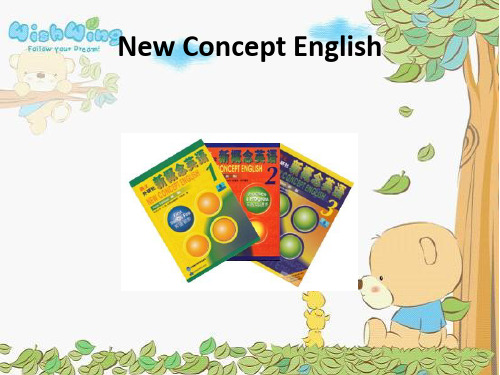
• Later that morning, When I was doing the housework, my husband phoned me from the office. • later that morning 那天上午晚些时候 • when I was doing the housework… • 是过去进行时态,表示过去正在进行的动作。 • my husband phoned me from the office • 是一般过去时,表示比较短晢的动作或事情。
New Concept English
Lesson 117 Tommy's breakfast
单词学习
• • • • • • dinning room(hall) coin mouth swallow later toilet 饭厅 n. 硬币 n. 嘴 v. 吞下 adv. 后来 n. 厕所,盥洗室
• • • • • • • • • • •
swallow ① v. 吞下,咽下 Tommy swallowed the coins. ② v. 抑制,使不流露 I tried hard to swallow my doubts. 我强忍着不露出怀疑的神色。 她忍住没笑,静静地坐在那里。 She swallowed a smile and sat there still. ③ v. 吞并;侵吞 我们公司去年被一家美国公司吞并了。 Our company was swallowed up by an American company last year. • Nazi Germany nearly swallowed up the whole Europe in World War II. • 第二次世界大战中,纳粹德国几乎吞并了整个欧洲。
Lesson117(课件)新概念英语第一册
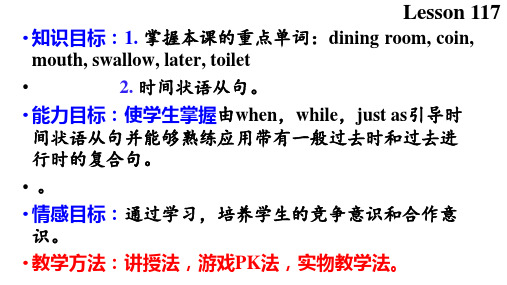
翻译下列句子。 • 1. 当我到达时,她正在做饭。 • When I __a_r_ri_v_e_d_, she_w_a_s___ _c_o_o_k_in_g_ a meal. • 4. 当我读书时,我妈妈正在做饭。 • _W__h_i_le____I was reading , • my mother __w_a_s_____ __c_o_o_k_i_n_g_____.
• A. him B. his
C. himself D. it
• (A) 4. Have you ever _______ Shenzhen?
• A. been to B. gone to C. went to
D. gone in
• (C ) 1. When he _______ I _______ a bath.
do housework
phone me from the office
一、选择题
• (C) 1. I _______ my pen everywhere but I couldn’t _______ it.
• A. looked for, found
B. found, looked for
• C. looked for, find
•。
• 情感目标:通过学习,培养学生的竞争意识实物教学法。
翻译下列句子。 • 1. 当我到达时,她正在做饭。 • When I ________, she______ _______ a meal. • 2. 当我读书时,我妈妈正在做饭。 • _________I was reading , • my mother _________ _____________.
While ... have breakfast, Tommy, find two small coins
新概念英语第一册117课

❖ ‘How’s Tommy?’ he asked.
❖ ‘I don’t know,’ I answered, ‘Tommy’s been to the toilet three times this morning, but I haven’t had any change yet!’
7. Mike and I___(play) basketball at that time yesterday afternoon.
课文讲解
❖ When my husband was going into the dining room this morning, he dropped some coins on the floor.
o’clock last night.
Practice Time!
1. While she ___ TV, Penny ___ asleep.
A. watches, was falling B. was watching, fell C.was watching, was falling D. watch, fell KEY: B
❖ As the children were playing in the garden, it began to rain.
❖ He put them both into his mouth. We both tried to get the coins. But it was too late. Tommy had already swallowed them!
I was having dinner when he came in.
新概念英语第一册Lesson117-118笔记(语法点+配套练习+答案)

put ... into ...
把...放到
have/has been to
曾去过某地
四、语法解析
1.现在进行时:说话此刻正在发生
结构:be (am/is/are) + v.ing
时间标志词:Look! Listen! now, at the moment
练习:
1.One of themis taking(take) photos for us now.
11.Didyoufinish(finish) your homework yesterday?
12.Her motherdidn’t give(not give) the girl any present.
13.When hewent(go) back to England, hewass(be) very tired.
The childrenwereallhappy.
Bothof the twins wanted to go to the theatre.
Allof my classmates are invited to my party.
three times三次
现在完成时的标志词
twice两次
once一次
have/has been to去过某地,已回
have/has gone to去了某地,未回
My father isn't at home, hehas gone toBeijing.
Mr Wang isn't here.Hehas gone toQingdao.
My fatherhas been toBeijing twice.
Ihaveneverbeen tothe Great Wall.
新概念英语第一册第117课Lesson117课文单词知识点

Lesson117When my husband was going into the dining room this morning, he dropped some coins on the floor.There were coins everywhere. We looked for them, but we could not find them all.While we were having breakfast, our little boy, Tommy, found two small coins on the floor.He put them both into his mouth. We both tried to get the coins, but it was too late. Tommy had already swallowed them!Late that morning, when I was doing the housework, my husband phoned me from the office.'How's Tommy?' he asked. 'I don't know,' I answered, 'Tommy's been to the toilet three times this morning, but I haven't had any change yet!' 今天早晨我丈夫走进饭厅时,把一些硬币掉在地上了。
到处都是硬币。
我们虽然找了,但没有把它们全部找到。
正当我们吃早饭时,我们的小男孩汤米在地上找到两枚小硬币。
他把这两枚硬币全都放进嘴里。
我们俩都试图把这两枚硬币拿出来,但太迟了。
汤米已经把硬币咽了下去!那天下午的晚些时候,当我正做家务时,我丈夫从办公室打来电话。
新概念英语第一册第117课
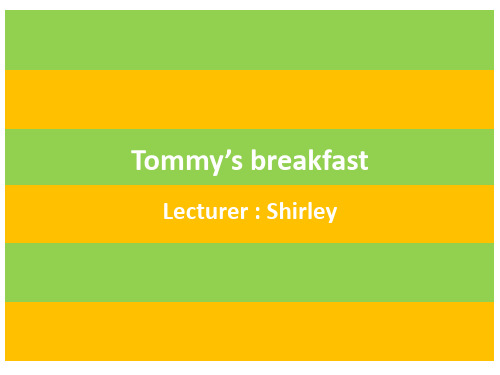
• There were coins everywhere. We looked for them , but we could not find them all. • While we were having breakfast , our little boy , Tommy , found two small coins on the floor.
Thank you!
Tommy’s breakfast
Lecturer : Shirley
What do you eat at breakfast?
FREE TALK
milk
Soybean milk
Steamed buns
Steamed stuffed buns
Listen to the tape
• What does Tommy eat at breakfast? • What does the woman mean by ‘change’ in the last sentence?
• has/have been to sp去过某地
我曾去过三次北京。
• • • •
Toilet Bathroom , washroom Toilet paper Toilet water
新概念英语第一册117课课件
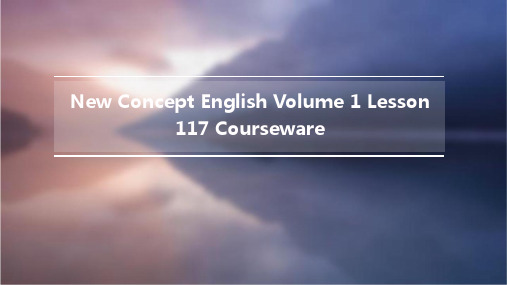
Words and expressions
The text includes a variety of useful vocabulary and expressions related to learning English.
04
reading comprehension
Reading materials
Text
"The Olympic Games"
Background information
The history and development of the Olympic Games, the significance of the Games in modern society, and the role of the Olympics in promoting global peace and friendship.
Some examples of words and expressions are: "global language," "interconnected world," "essential," "communication," "learning curve," "fluency," "conversational skills."
01
Sorting out the content of the text
Topic of the text
The topic of the text is about the importance of learning English.
新概念英语第一册117课课件资料ppt

housework, my husband telephoned me from the
office.
earlier
早些时候
给某人打电话
该句为when 引导的时间状语从句
主句为一般过去时表示比较短晢的动作或事情
‘How’s Tommy ?’he asked . ‘I don’t know ,’I answered . ‘Tommy’s been to the toilet three times this morning , but I haven’t had any change yet .
but连接的并列句
has been to 去过某地 time 次数,(可数): three times > twice > once change 零钱 = coin Change 变化 双关语 yet 用于完成时的否定句和疑问句中。
Phrases
1. go into… 2. go out of… 3. look for
Later that morning ,when I was doing the housework ,Bill phoned me from
the office .
过去进行时表示
后来,晚些时候 later that morning,
从句
when I
w过as去正d 在o i进n行g的动t作he。
Focus on grammar
We looked for them, but we could not find them all.
While we were having breakfast, our little boy, Tommy, found two small coins on the floor.
新概念英语第一册课文翻译及学习笔记Lesson117知识分享

新概念英语第一册课文翻译及学习笔记Lesson117【课文】When my husband was going into the dining room this morning, he dropped some coins on the floor.There were coins everywhere. We looked for them, but we could not find them all.While we were having breakfast, our little boy, Tommy, found two small coins on the floor.He put them both into his mouth. We both tried to get the coins, but it was too late. Tommy had already swallowed them!Late that morning, when I was doing the housework, my husband phoned me from the office.'How's Tommy?' he asked. 'I don't know,' I answered,'Tommy's been to the toilet three times this morning, but I haven't had any change yet!'【课文翻译】今天早晨我丈夫走进饭厅时,把一些硬币掉在地上了。
到处都是硬币。
我们虽然找了,但没有把它们全部找到。
正当我们吃早饭时,我们的小男孩汤米在地上找到两枚小硬币。
他把这两枚硬币全都放进嘴里。
我们俩都试图把这两枚硬币拿出来,但太迟了。
汤米已经把硬币咽了下去!那天下午的晚些时候,当我正做家务时,我丈夫从办公室打来电话。
新概念英语第一册117课 课件(共17张PPT)
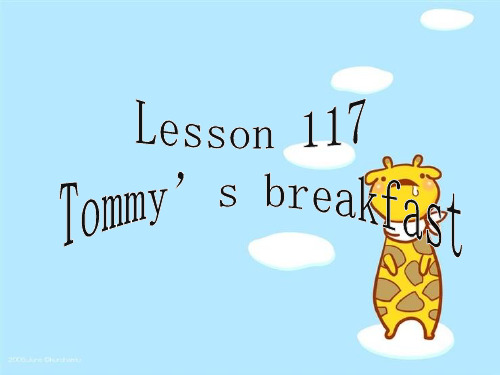
• 5. The train left when I was buying the tickets.
• 6. It rained heavily when I was driving to London.
A. is having B. have C. has D. was having
4. What ____ you ____from 7 to 9 yesterday ? A. were, doing B. did. do C. have, done
5.Look! Lily with her sister __ a kite on the playground.
shaving
cut
Exercise P239
• 1. He knocked at the door when I was answering the phone.
• 2. He came downstairs when I was having breakfast.
• 3. The phone rang when I was washing the dishes.
过去进行时VS现在进行时
结构
现在am/is/are+v-ing 过去was/were+v-ing
The students are drawing pictures now.
The students were drawing pictures when the teacher came in.
3.时间状语:
New words and expressions
dining room
新概念英语第一册117课课件

Language logic
Detailed description
Through sentence translation exercises, students can learn the language logic of English, improve the fluency and accuracy of English expression.
Vocabulary exercises
Summary words
Vocabulary application
Detailed description
Through vocabulary practice, students can learn how to apply newly learned vocabulary in practical contexts, deepening their understanding of the meaning of vocabulary.
indicates an action in the future or plan, often preceded by "to". For example, "I want to go to the park."
02
Analysis of key and difficult points
Key vocabulary and pd expanded knowledge
English listening and speaking training
Listening training
Provide listening materials related to the content of the text, such as English news, movie clips, etc., to help students improve their English listening skills.
新概念英语第一册第117课
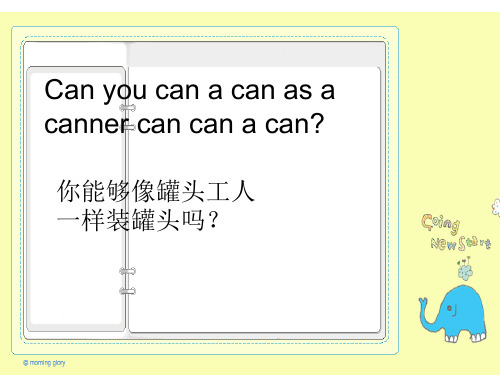
• • • • • •
• • • •
While we were having breakfast, our little boy, Tommy, found two small coins on the floor. He put them both into his mouth. We both tried to get the coins, but it was too late. Tommy had already swallowed them! 句中用了过去完成时形式 had swallowed。过去完成时用 来表示过去两个动作中发生在前的那个动作。显然,句中 咽下硬币的动作发生在夫妇俩能够把硬币从汤米手中抢过 来之前。 Later that morning, when I was doing the housework, my husband phoned me from the office. later是副词late的比较级。’晚些时候’ earlier是early 的比较近。‘早些时候’
• • • •
‘How's Tommy?’he asked. ‘I don't know,’ I answered, ‘Tommy's been to the toilet three times this morning, but I haven't had any change.
• change是个多义词, “零钱”. “变化”. 此处既可指“硬币 ”;也可指“情况的变化”。这是双关(pun)修辞法。 • I wish to change some pocket money. 我希望换些零钱。 • A leopard cannot change its spots. 积习难改。
新概念英语第一册 lesson 117
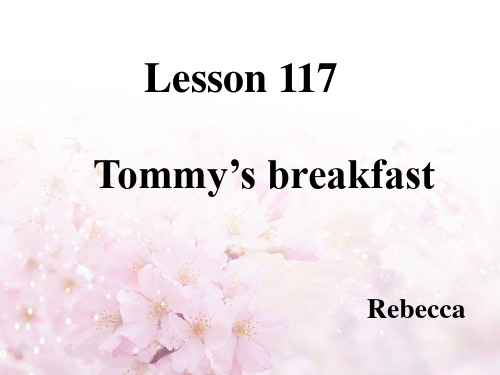
Later that morning, when I was doing the housework, my husband phoned me from the office.
"How is Tommy?" he asked. "I don't know," I answered, "Tommy's been to the toliet three times this morning, I haven't had any change yet!"
The boss arrived when I was typying a letter. The train left when I was buying the tickets.
6. It rained heavily. I drove to London.
It rained heavily when I was driving to London.
Example: He arrived. I had a bath. He arrived when I was having a bath.
4. The boss arrived. She typed a letter. 5. The train left. I bought the tickets.
While we were having breakfast, our little boy, Tommy, found two small coins on the floor.
Tommy's break来自astHe put them both into his mouth. We both tried to get the coins, but it was too late. Tommy had already swallowed them!
新概念英语第一册第117课课件讲课讲稿

117课 过去进行时练习: 一、仿照例句用所给 的词汇造句。
1. I, see him, he, cross the street I saw hi m while he was crossing the street. (He was crossing the street when I saw him.) A. the sun, shine, we, come out B. she, study at college, the war, break out C. she, work in a factory, the city, be liberate d (放) D. he, lose his pen, he, go sightseeing in th e city
阅读课文回答问题
What does the she mean by ‘change’ in the last sentence ?
再看一遍课文
When my husband was going into the dining room this morning
he dropped some coins on the floor.
定语从句的先行词是名词或代词;而同位语从句的先行词只能是 名词,而且仅限于idea,plan,fact,theory,promise,hope, news,doubt,truth,information,suggestion,question, thought,belief,conclusion等少数名词。
本课语法同位语
同位语,代表一个名词(或其它形式)对另一个名词或代词进行 修饰,限定或说明。同位语与被它限定的词的格要一致,并常常紧 挨在一起。
由两个或两个以上同一层次的语言单位组成的结构,其中前项与 后项所指相同,句法功能也相同,后项是前项的同位语其中常用 ‘and’连接。
新概念1册 117课 课件加练习
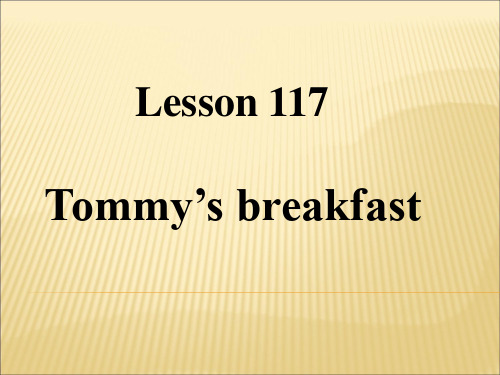
She was looking for her passport yesterday. 昨天她在找他的护照。 Did she find it? 找到了吗? Yes,she find it under the chair. 找到了,他是在椅子地下找到的。 3.While we were having breakfast, our little boy , Tommy, found two small coins on the floor.正当我们吃早饭时,我 们的小男孩汤米在地上找到了两枚小硬币。 【分析】主从复合句,while 引导时间状语从句, Tommy 作our little boy 的同位语。 【例句】While she was cleaning the room, her husband telephoned her. 她正在打扫房间的时候,她的丈夫来电话了。
Lesson 117
Tommy’s breakfast
单词学习 1.mouth n.嘴 张开你的嘴。 Open your mouse. Don’t talk with your mouth full! 嘴里塞满食物时不要说话!
Shut your mouth! (口语)闭嘴!
【惯】 from mouth to mouth 口口相传地 The story was passed on from mouth to mouth. 这个故事口口相传。 from hand to mouth 勉强糊口。 Life was too hard for my grandfather before liberation. He could just live from hand to mouth. 解放前爷爷的生活境况很差,只能勉强糊口。
【注释】1.go into“走进”,强调进入的动作,反义词go out of走出· · · · 2.drop,掉下: Be careful!Don’t drop the vase. 小心,别把花瓶摔了。 drop,丢失,丢掉: I dropped my pen on the way home. 回家路上我把笔弄丢了。
新概念英语一册Lesson 117 Jimmy's breakfast
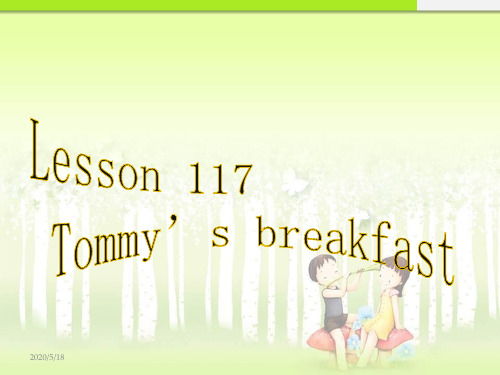
2,There were coins everywhere. We looked for them, but we could not find them all. ① everywhere 到处都是 ②look for 寻找,强调动作。 Find 找到,强调结果 例:I looked for my exercise book everywhere this morning, but I couldn’t find it. listen / hear look at / see
③ change n. 零钱,即指前面的coin There's your change. — Thanks very much. v. 变化,改变 In fall the leaves change from green to brown.
T: Did the two of you try to get the coins? S: Yes, we both tried to get the coins. miss the train, knock at the door, meet him at the station, make appointment, hurt yourselves, get off the bus, leave early, slip, find all this money.
花露水
toilet water
Key words and expressions
ring ring-rang-rung v. 打电话 I'll ring you back in about half an hour. n. 响铃 Be quick. The bell is ringing. n. 电话 We'll give him a ring as soon as we get back 戒指 wedding ring
新概念英语第一册第117课完整ppt课件

阅读课文回答问题
What does the she mean by ‘change’ in the last sentence ?
精选ppt
再看一遍课文
精选ppt
When my husband was going into the dining room this morning
精选ppt
续的或同时发生的,那么主从句的动词都可用过去
进行时。
精选ppt
本课语法过去进行时
1.过去进行时由“主语+was/were+动词ing”构成 2.过去进行时的否定式由“主语+was/werenot+现 在分词”构成 3.过去进行时的疑问式由“was/were+主语+现在 分词”组成 句型 肯定句=主语+was/were+doing+其它 否定句=主语+was/were+not+doing+其它 一般疑问句问语=Was/Were+主语+doing+其它 答语:Yes,Iwas/were.或No,Iwasn't/were’t. 特殊疑问句=特殊疑问词精+选p一pt 般疑问句+其它
精选ppt
本课语法
1.look for,寻找(强调动作过程);find,找到(强调寻找的结 果)。 2.Tommy had already swallowed them! 汤米已经把硬币咽了下去 句中用了过去完成时形式 had swallowed。过去完成时用来表示过去 两个动作中发生在前的那个动作。显然,句中咽下硬币的动作发生在 夫妇俩能够把硬币从汤米手中抢过来之前。 3.later that morning,那天上午的晚些时候。 later是副词late的比较级。 4.any change change是个多义词,既有“零钱”的意思,也有“变化”的意思。此 处既可指“硬币”;也可指“情况的变化”。这是双关(pun /p)n/) 修辞法。
新概念英语第1册_第117-118课
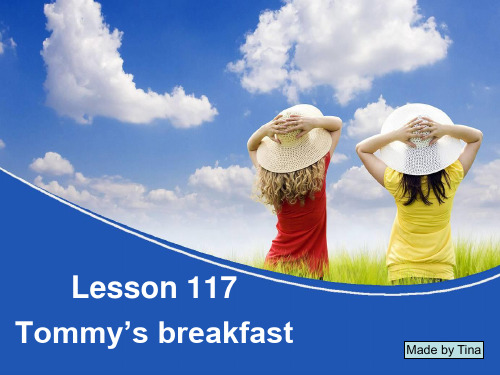
晚些时候 earlier 早些时候
Language points
8. Tommy’s been to the toilet three times this morning, but I haven’t had any change yet! • has been to 去过某地 • 与has gone to • 几次(time 次数,可数): • three times > twice > once • have had这里的had 原形是have=get=see弄到, 看到。 • yet 用于完成时的否定句中。
Grammar
1.构成 过去进行时 • was/were +现在分词 • 疑问句式 把 was/were 提前 • 否定句式 在 was/were 的后面加 not • 例:
Grammar
例:
Grammar
• 2. 如果过去的两个动作同时发生,我们可 以用when /while连接这两个同时发生的动 作。译作“正当…的时候”. • when 和 while用法区别:when既指时间 点,也可指一段时间; while只指一段时间, 因此when引导的时间状语从句中的动词可 以是终止性动词,也可以是延续性动词, 而while从句中的动词必须是延续性动词。
★dining room • dining table • sitting room / living room • bedroom • kitchen • balcony • garden 饭厅,餐室 餐桌 客厅 卧室 厨房 阳台 花园
Key words&expressions
★ coin n. 硬币 (note 纸币) toss a coin 掷硬币(打赌正面或反面) • P own coin. 以其人之道还治其人之身。
- 1、下载文档前请自行甄别文档内容的完整性,平台不提供额外的编辑、内容补充、找答案等附加服务。
- 2、"仅部分预览"的文档,不可在线预览部分如存在完整性等问题,可反馈申请退款(可完整预览的文档不适用该条件!)。
- 3、如文档侵犯您的权益,请联系客服反馈,我们会尽快为您处理(人工客服工作时间:9:00-18:30)。
JIM:Look! Everyone's in the garden. CAROL:Hello, Helen. Hello, Jim. TOM:Everybody wants to have lunch in the garden.
It's nice and warm out here. CAROL:Come and have something to drink. JIM:Thanks, Carol. May I have a glass of beer
• dining room
• coin
n.
• mouth
n.
• swallow v.
• later
adv.
• toilet
n.• ring源自v.饭厅 硬币 嘴 吞下 后来 厕所 响
Key words&expressions
★ coin n. 硬币 (note 纸币)
toss a coin
★ 掷硬币(打赌正面或反面)
dining room toilet
mouth
coin ring
swallow later
toilet coin swallow
later
Questions on the text
• What does she mean by ‘change’ in the last sentence?
Video
Key words&expressions
★ later
1) adv. 后来,较迟地,较后地 • three days later 三天后 • He came later than usually.他比平常来得晚。 • See you later. 回头见,再见。 • sooner or later 早晚,总有一天
when I was doing the housework, my husband phoned me from the office. ‘How's Tommy?’he asked. ‘I don't know,’ I answered, ‘Tommy's been to the toilet three times this morning, but I haven't had any change yet!’
Key words&expressions
★ toilet n. 厕所,盥洗室
• bathroom/washroom /restroom/lavatory • public conveniences 委婉用语(英) • comfort station 委婉用语(美) • Water Closet (wc) 委婉用语(欧) • toilet paper/ toilet roll 卫生纸 • toilet water 花露水
I'm sure there's no one at home. HELEN:But that's impossible.
Carol and Tom invited us to lunch.
Look through the window. HELEN:Can you see anything? JIM:Nothing at all. HELEN:Let's try the back door.
v.
开玩笑
adj. 睡觉,睡着
n.
眼镜
Sophy Mike
Snow Jack
Rain
Tony
Jerry Bill
lily Betty
Linda Coco
HELEN:Isn't there anyone at home? JIM:I'll knock again, Helen.
Everything's very quiet.
please? CAROL:Beer? There's none left.
You can have some lemonade. JIM:Lemonade! TOM:Don't believe her, Jim.
She's only joking.
Have some beer!
Key words&expressions
以其人之道还治其人之身。
Pay a person back in his own coin.
Key words&expressions
★ mouth n. 嘴
Open your mouth.
张开你的嘴。
Sehyeubtroywosu, erymeso, nuotshe,. ears, mouth闭嘴(口) 眉毛,眼睛,鼻子,耳朵,嘴巴
Video1
When my husband was going into the dining room this morning, he dropped some coins on the floor. There were coins everywhere. We looked for them, but we could not find them all. While we were having breakfast, our little boy, Tommy, found two small coins on the floor. He put them both into his mouth. We both tried to get the coins, but it was too late. Tommy had already swallowed them! Later that morning,
from hand to mouth from mouth to mouth
勉强糊口 口口相传的
Key words&expressions
★ swallow
v. 吞……,咽…… 1.奥巴马很饿,所以他狼吞虎咽的吃热狗. Obama is so hungry that he is swallowing the hot dog. 2. 他把药和水一起吞下。 • He swallowed (up) the medicine with water.
Lesson 117 Tommy’s breakfast
Key words&expressions
knock quiet impossible invite lemonade joke asleep glasses
v.
敲,打
adj. 宁静的,安静的
adj 不可能的
v.
邀请
n.
柠檬水
